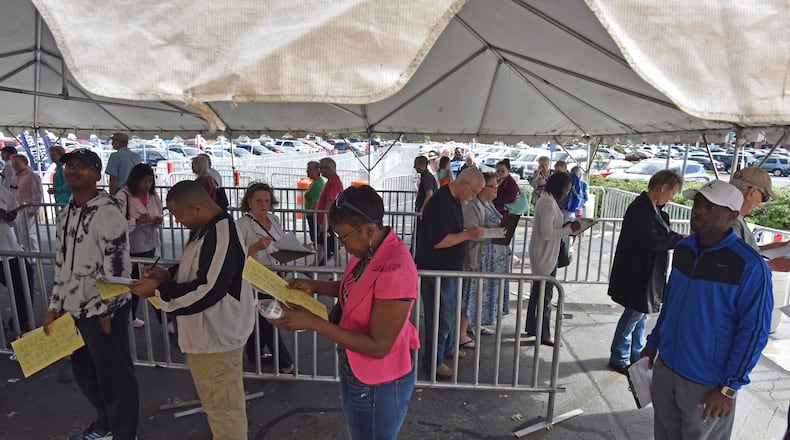A court order issued Thursday despite objections by Secretary of State Brian Kemp and other elections leaders could affect several hundred Georgia absentee ballots — once the legal wrangling plays out.
U.S. District Court Judge Leigh Martin May’s restraining order stops officials across the state from rejecting absentee ballots because of signatures deemed not to match those already on file. The new procedures and voter protections created by the order would likely increase the workload for Georgia’s elections officials, many of whom are already in overdrive as Nov. 6 rapidly approaches.
Yet even with absentee votes being cast at a much higher rate than in other recent midterm elections, the tangible impact on Georgia's upcoming elections is hard to predict.
Exact numbers of impacted voters are difficult to measure because of the lack of uniformity in how rejections are reported. But an analysis by The Atlanta Journal-Constitution found that, through Wednesday, at least 537 mail-in ballots or ballot applications had been rejected statewide due to signature-related issues.
The judge’s restraining order will require those rejections to be re-examined, and that process is likely to result in new votes being counted. The new court-ordered standard means absentee ballots that come in over the next two weeks will produce votes that wouldn’t otherwise have been counted.
Michael McDonald, a political scientist at the University of Florida who runs the United States Elections Project, said all of that could impact any election where the margin is “razor-thin.” Across Georgia, that definition has the potential to apply to any number of races, from the governor’s race on down.
More absentee ballots being counted could also play a significant role in places like Gwinnett County — which was named as a co-defendant in the lawsuits that produced the new injunctions and, with about 140 signature-related absentee rejections reported thus far, accounts for more than a quarter of the rejections in the state.
Long a Republican stronghold, Gwinnett has rapidly shifted toward the Democratic Party in recent years as demographic changes take hold. A number of local and state races could come down to the wire on Election Day.
One of the most hotly contested elections in both Gwinnett and the state may be for House District 105 — which, in 2016, was decided by just over 200 votes.
“The parties will harvest as many votes as they can by culling through the absentee ballot rejection list for their likely supporters whose ballots were rejected for a signature matching failure,” McDonald said.
The success of the injunction — the product of lawsuits led by the American Civil Liberties Union, the Lawyers’ Committee for Civil Rights Under Law and the Coalition for Good Governance — could also provide a bump to Democrats, University of Georgia political scientist Charles Bullock said.
The absentee ballot fight is part of a larger battle over voting rights playing out across Georgia.
The issue has drawn national scrutiny to the state this election season and focused attention on Kemp’s decision to continue as secretary of state, an office that oversees elections, even as he runs for governor. Voting and civil rights advocates, as well as his Democratic opponent Stacey Abrams, have accused Kemp of voter suppression.
“It plays well if you’re a Democratic candidate,” Bullock said, “because it’s the kind of message that’s likely to inspire some people that might not otherwise go to the polls.”
If Kemp and others contesting the lawsuits have their way, though, the judge’s order could be short-lived.
Late Thursday afternoon, Kemp’s lawyers filed a motion to stay the injunction — a move that amounts to asking May to hold off on enforcing the order while they appeal to the Eleventh Circuit Court.
“Last-minute challenges to longstanding election procedures have long been disfavored because they threaten to disrupt the orderly administration of elections, which is essential to the functioning of our participatory democracy,” the motion said.
The injunction granted by May specifically orders the Secretary of State’s office to inform local elections offices that they should not reject absentee ballots due to alleged signature mismatches. Instead, they’re ordered to mark the ballots as provisional and give voters a “pre-rejection notice” via first-class mail and email, when possible, as well as an opportunity to resolve the discrepancy.
Absentee ballot applications with potential signature issues are to be treated similarly, according to the court.
The judge’s order is also retroactive, meaning it affects mail-in voters that were already rejected.
In a matter of hours Thursday, voting rights groups went from celebrating the judge’s decision to criticizing the state’s decision to keep fighting against it.
“We condemn this continued effort by Brian Kemp to fight relief that can help ensure that more eligible voters are heard this election cycle,” said Kristen Clarke, president of the Lawyers’ Committee. “This is a clear attempt to hijack relief that is incredibly time-sensitive given the fact that we are mere days away from the election.”
11 DAYS TO GO
The Atlanta Journal-Constitution’s election reporting is focused upon providing you with a deep understanding of the candidates, the key issues and what’s motivating Georgia voters. We are covering each race from all angles, giving equal weight to the candidates as you prepare to choose.
We are 11 days away from the Nov. 6 election.
Keep Reading
The Latest
Featured






